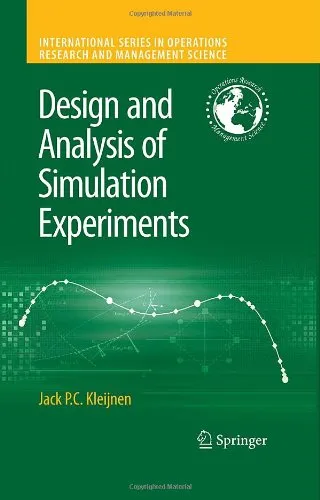Design and Analysis of Simulation Experiments (International Series in Operations Research & Management Science)
4.2
Reviews from our users

You Can Ask your questions from this book's AI after Login
Each download or ask from book AI costs 2 points. To earn more free points, please visit the Points Guide Page and complete some valuable actions.Introduction
Welcome to the comprehensive world of simulation experiments where the art of modeling converges with the science of design. "Design and Analysis of Simulation Experiments" by Jack P.C. Kleijnen stands as a definitive work in this dynamic field. This book is a part of the esteemed International Series in Operations Research & Management Science, and it is a must-read for those looking to delve deep into the methodologies and applications of simulation experiments. This introduction offers you a detailed summary, key takeaways, some of the most enlightening quotes from the book, and reasons why this book holds significant relevance today.
Detailed Summary of the Book
"Design and Analysis of Simulation Experiments" offers a thorough exploration of the key concepts and methodologies employed in the design and analysis of simulation experiments. The text is structured to provide a balance between theoretical insights and practical applications, making it suitable for both academics and industry professionals. The book begins with foundational topics including the importance of simulation in operations research, and gradually progresses towards more complex subjects such as the statistical analysis of simulation data, variance reduction techniques, and the use of experimental designs like factorial and fractional factorial designs. A notable emphasis is placed on the response surface methodology (RSM) which guides the optimization of simulation models. The book also covers advanced topics such as Kriging, which is used for the interpolation of simulation outputs, and provides insights into metamodeling techniques. Through an integrative approach, the author ensures that readers comprehend how to apply these concepts in real-world scenarios, supported by numerous examples and case studies.
Key Takeaways
- Understanding the foundational principles that govern simulation experiments.
- Mastering the art of designing efficient simulation experiments using various methodologies.
- Gaining proficiency in statistical tools for analyzing simulation data to derive meaningful insights.
- The application of advanced techniques such as Kriging and metamodeling for improving simulation experiments.
- Learning how to use response surface methodology to optimize and refine simulation models effectively.
Famous Quotes from the Book
"Simulation is not only a tool for research but also a language for communicating complex systems and their behaviors."
"Experimentation in simulation seeks to unravel the mysteries of complex models through systematic exploration and robust analysis."
Why This Book Matters
In a world that increasingly relies on data-driven decisions and intricate system models, understanding the intricacies of simulation experiments is paramount. "Design and Analysis of Simulation Experiments" plays a critical role in bridging the gap between theory and practical implementation. It equips practitioners with the necessary tools to effectively design, execute, and analyze simulation experiments—ensuring that the outcomes are both insightful and actionable. Furthermore, the book's integration of both classical and modern techniques offers a well-rounded perspective that is adaptable across various industries including manufacturing, healthcare, logistics, and finance. Whether you are a student, an academic, or a practitioner, this book provides the foundational knowledge and advanced capabilities needed to navigate the complexities of simulation with confidence and expertise.
Free Direct Download
Get Free Access to Download this and other Thousands of Books (Join Now)
For read this book you need PDF Reader Software like Foxit Reader


